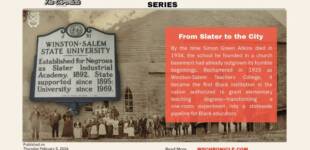Atkins CDC will run part of Union Station
Union Station is a former station that was a automotive repair shop before being purchased by the City. Renovations to turn into a transportation center will begin in 2016.
By Todd Luck
The Chronicle
The City Council voted Mon., Dec 21 to put the Atkins Community Development Corporation in charge of a part of the planned Union Station transportation center.
Renovations on Union Station are planned to start early next year. The former train station located beside Winston-Salem State University will be turned into a local and regional bus hub, augmenting the nearby Clark Campbell Transportation Center downtown, and is eventually envisioned to be used for regional and long distance rail service. Atkins CDC will manage one-third of the building devoted to commercial use.
“We’ll be looking for tenants who can supply commercial uses that are complementary to the transportation focus of the project,” said Atkins CDC Executive Director Carol Davis.
Davis said while there are no plans yet as to exactly what will occupy the space, businesses offering food, drink, reading materials and other things appealing to travelers would be a good fit.
Union Station was built in 1926 and is on the National Register of Historic Places. It housed an automobile repair shop for years before it was purchased by the City in 2012. Renovations to Union Station are funded with limited obligation bond money, which only required City Council approval and not a public vote, and are separate from the bonds approved by voters last year.
Atkins CDC was started by Winston-Salem State University to be a catalyst for economic development in the areas around the campus. The CDC is responsible for turning the building that formerly housed the Salvation Army Boys and Girls Club on Martin Luther King Jr. Drive into the Enterprise Center, a small business center that currently houses 24 businesses.
The city will pay Atkins CDC $120,000 a year to manage part of Union Station. The CDC will pay the city a lease of $120,000 per year plus 85 percent of the revenue it makes from sublet leases of the space in the building. The agreement is for ten years and rates could be renegotiated after five years.









